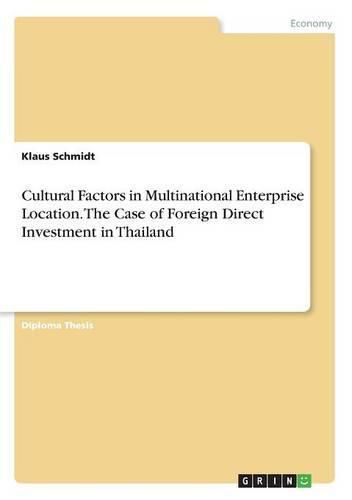Readings Newsletter
Become a Readings Member to make your shopping experience even easier.
Sign in or sign up for free!
You’re not far away from qualifying for FREE standard shipping within Australia
You’ve qualified for FREE standard shipping within Australia
The cart is loading…






This title is printed to order. This book may have been self-published. If so, we cannot guarantee the quality of the content. In the main most books will have gone through the editing process however some may not. We therefore suggest that you be aware of this before ordering this book. If in doubt check either the author or publisher’s details as we are unable to accept any returns unless they are faulty. Please contact us if you have any questions.
Diploma Thesis from the year 1998 in the subject Business economics - Investment and Finance, grade: 1.7, University of Paderborn, language: English, abstract: Despite crises and uncertainty in international capital markets, foreign direct investment (FDI) by multinational enterprises (MNE) is booming. The buzzword is globalization. The business world is expected to be moving closer together through more or less recent developments in communication technologies and transportation facilities. The political ideal of democracy along with a liberalization of national economies seems to have finally gained the recognition it deserves as the system that in the end allows for the best utilization of wealth creating endowments. Besides differences in economic development, cultural differences remain as a single important means of distinguishing between people from several nations (Huntington 1996; Axford 1995). The critical issue is that this situation is being recognized and mankind restrains from emphasizing distinctions, and instead focuses on working out compatibility between cultures. This paper is separated into three interactive parts. Part I deals with the theoretical background behind this study, and after these introductory notes, gives an overview of the theory of international production in order to show which factors influence MNEs and their activities. Part II of the paper is devoted to the interaction between the two cultures of Thailand as a host country and the USA as the investor’s home country. First, both value systems and environmental factors are analyzed and compared. Then some findings from interviews with U.S.-American7 investors on cultural factors that influenced their location selection will be summarized in order to provide some anecdotal evidence on how trust was generated in their decision to invest in Thailand. In Part III, the findings from the two previous parts will be synthesized into the theory of international production. Based on the
$9.00 standard shipping within Australia
FREE standard shipping within Australia for orders over $100.00
Express & International shipping calculated at checkout
This title is printed to order. This book may have been self-published. If so, we cannot guarantee the quality of the content. In the main most books will have gone through the editing process however some may not. We therefore suggest that you be aware of this before ordering this book. If in doubt check either the author or publisher’s details as we are unable to accept any returns unless they are faulty. Please contact us if you have any questions.
Diploma Thesis from the year 1998 in the subject Business economics - Investment and Finance, grade: 1.7, University of Paderborn, language: English, abstract: Despite crises and uncertainty in international capital markets, foreign direct investment (FDI) by multinational enterprises (MNE) is booming. The buzzword is globalization. The business world is expected to be moving closer together through more or less recent developments in communication technologies and transportation facilities. The political ideal of democracy along with a liberalization of national economies seems to have finally gained the recognition it deserves as the system that in the end allows for the best utilization of wealth creating endowments. Besides differences in economic development, cultural differences remain as a single important means of distinguishing between people from several nations (Huntington 1996; Axford 1995). The critical issue is that this situation is being recognized and mankind restrains from emphasizing distinctions, and instead focuses on working out compatibility between cultures. This paper is separated into three interactive parts. Part I deals with the theoretical background behind this study, and after these introductory notes, gives an overview of the theory of international production in order to show which factors influence MNEs and their activities. Part II of the paper is devoted to the interaction between the two cultures of Thailand as a host country and the USA as the investor’s home country. First, both value systems and environmental factors are analyzed and compared. Then some findings from interviews with U.S.-American7 investors on cultural factors that influenced their location selection will be summarized in order to provide some anecdotal evidence on how trust was generated in their decision to invest in Thailand. In Part III, the findings from the two previous parts will be synthesized into the theory of international production. Based on the